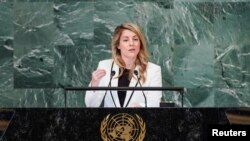More than a dozen of the world's female foreign ministers will join a virtual meeting hosted by Canada Thursday to discuss Iran’s brutal crackdown against protesters, Canadian Foreign Minister Mélanie Joly said Wednesday in a statement.
The death last month of Mahsa Amini while in the custody of Tehran’s morality police has ignited unrest throughout Iran.
Joly and 14 other women will meet virtually 8 a.m. Thursday EDT (1200 GMT). The gathering will hear from women of Iranian heritage and discuss the state of women's and human rights in Iran. The meeting will give the officials an opportunity to coordinate efforts and discuss "ways to increase their collective support for the Iranian people,” the statement said.
"My counterparts and I will gather to send a clear message: the Iranian regime must end all forms of violence and persecution against the Iranian people, including their brutal aggressions against women in particular," Joly said. "Canada will continue to stand by the courageous Iranians who are fighting for their human rights and standing up for their mothers, sisters, wives and daughters. Women's rights are human rights.”
Call will involve 15 leaders
Iran has accused countries that have expressed support for the protests of meddling in its internal affairs.
Foreign ministers from Germany, Chile, New Zealand and Norway are among the 14 who will join Canada, a government source told Reuters. France will join the call, but Foreign Minister Catherine Colonna will not be able to, the source said.
Other countries expected to participate in the meeting are Albania, Andorra, the Central African Republic, Chile, Iceland, Kosovo, Libya, Liechtenstein, Mongolia and Panama, Reuters reported.
Several nations, including Canada and the United States, have imposed sanctions on Iran.
Joly announced additional sanctions on Wednesday over human rights violations in Iran, targeting four entities and six individuals, including Iran's Deputy Interior Minister Majid Mirahmadi, Reuters reported.
Amini, a 22-year-old woman from Iran’s Kurdistan region, was arrested on September 13 by the so-called morality police for improper wearing of the hijab. She died three days later while in police custody.
Iran's religious leaders have tried to portray the unrest as part of a breakaway uprising by the Kurdish minority threatening the nation's unity, rather than as a protest of clerical rule.
Some material for this article came from Reuters.





